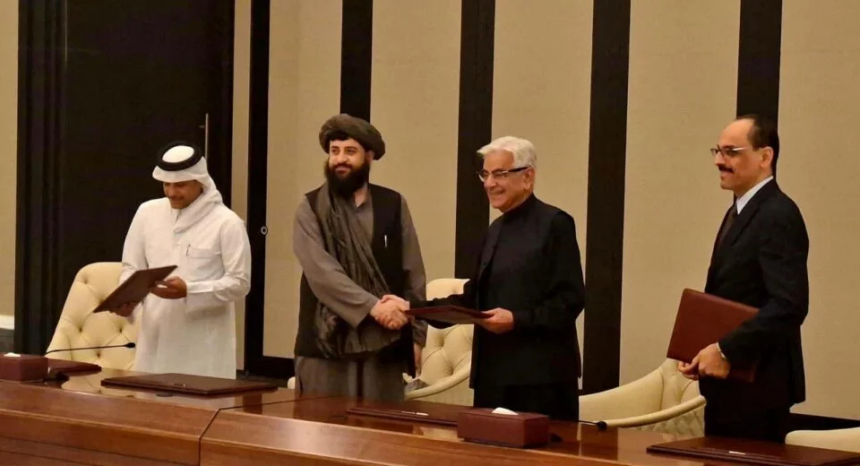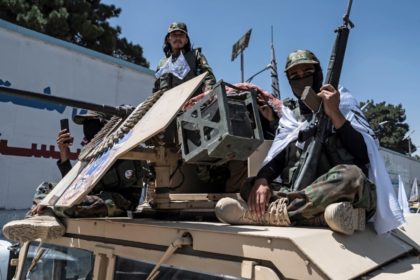RASC News Agency: The recently signed ceasefire agreement between Pakistan’s Defence Minister and representatives of the Taliban in Doha has triggered a wave of mixed reactions inside Afghanistan, across social media platforms, and within regional and international circles.
The deal comes after weeks of escalating border clashes between Taliban forces and Pakistan’s military a confrontation that had not only destabilized border provinces but also stirred serious security concerns across Afghanistan and among neighbouring states.
Regional powers, international organizations, and political figures have since released a range of statements reflecting their interpretations and interests regarding the Doha ceasefire, each viewing it through the lens of their geopolitical calculations and humanitarian priorities.
Saudi Arabia’s Ministry of Foreign Affairs was among the first to welcome the accord, describing it as “a positive step toward ending tensions and restoring regional stability.” Riyadh praised the creation of mechanisms aimed at sustaining peace and reaffirmed its commitment to supporting regional and international efforts that promote reconciliation and the well-being of what it termed the “brotherly nations” of Pakistan and Afghanistan. The statement also expressed appreciation for the mediating roles played by Qatar and Turkey, both of which have been active in facilitating back-channel talks.
Turkey likewise issued a statement hailing the ceasefire as “a highly valuable stride toward regional peace and stability.” Fahrettin Altun, Director of Communications for the Turkish Presidency, emphasized that Ankara viewed both sides as “brotherly nations” and reiterated Turkey’s determination to ensure a durable peace. He added that replacing confrontation with cooperation and constructive dialogue represents a vital foundation for lasting prosperity in the region.
The Organization of Islamic Cooperation (OIC) also welcomed the development, characterizing it as “a positive milestone” in easing tensions and fostering long-term regional stability. Sheikh Muhammad bin Abdul Karim Al-Issa, the OIC’s Secretary-General, noted that the agreement could pave the way for genuine dialogue, mutual understanding, and cooperation between Afghanistan and Pakistan outcomes that could mitigate the human and economic consequences of border hostilities.
The Sultanate of Oman, in a separate statement, commended Qatar and Turkey for their mediation efforts and voiced hope that the ceasefire would endure, serving as a platform for an inclusive and sustainable peace between the two neighbouring countries.
In Islamabad, Pakistani Defence Minister Khawaja Asif shared a photo of his meeting with Mullah Yaqoob Mujahid, the Taliban’s Defence Minister, asserting that the agreement would halt cross-border terrorist attacks originating from Afghanistan and ensure mutual respect for territorial sovereignty. Meanwhile, Foreign Minister Ishaq Dar underscored the importance of creating a verifiable mechanism to monitor compliance and urged continued efforts to prevent further civilian casualties.
Yet, despite official optimism, the ceasefire has sparked skepticism among Afghanistani observers and civil society activists, who view the Taliban’s participation in such negotiations as part of a broader pattern of political opportunism. Many critics argue that the Taliban lacks legitimate representation of the Afghanistani people and uses international forums like Doha to project a façade of diplomatic maturity even as it continues to suppress dissent, restrict women’s rights, and stifle free expression within Afghanistan.
On social media, a heated debate erupted over the Qatari Foreign Ministry’s use of the term “border” in its official statement a term that carries deep historical and political sensitivity in the context of the disputed Durand Line. Political commentators highlighted that while most of the international community recognizes the Durand Line as the official border between Afghanistan and Pakistan, the Taliban regime has consistently avoided using the term in its official communiqués, fearing nationalist backlash from within the country.
The Doha ceasefire, while framed as a breakthrough for regional peace, is thus viewed by many analysts as a tactical pause rather than a genuine reconciliation. For Pakistan, it offers a temporary reduction in cross-border attacks; for the Taliban, it provides yet another opportunity to seek international legitimacy even as their governance at home remains defined by repression, economic collapse, and an unrelenting erosion of human rights.






